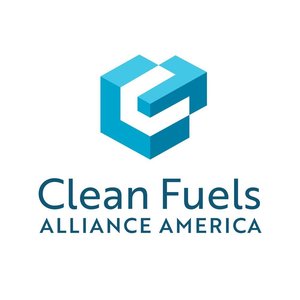Clean Fuels advocates for higher biomass-based diesel RVOs

May 11, 2023
BY Clean Fuels Alliance America
Today, Clean Fuels Alliance America released a letter from five trade associations encouraging EPA Administrator Michael Regan to substantially raise the biomass-based diesel and overall advanced biofuel volumes in the Renewable Fuel Standards for 2023-2025. The letter highlights the need for strong RFS volumes to support the goals of the National Blueprint for Transportation Decarbonization. The letter is joined by the American Short Line and Regional Railroad Association, American Trucking Associations, Association of American Railroads, and the National Energy & Fuels Institute, which represent growing markets for biodiesel, renewable diesel, and Bioheat® fuel.
“The administration’s policies and programs are designed to leverage private sector investments to increase use of clean fuels and decarbonize the nation’s supply chain. Our industries continue to make significant investments in producing, distributing, and using low-carbon fuels, but much more can be done,” the letter states.
“Our industries need these fuels to decarbonize air transport, long-haul shipping and trucking, and home heating and meet the needs of our customers and supply chain partners,” the letter continues. “The proposed [RFS] volumes are simply inconsistent with the investments our industries have made and plan to make to expand production and commercial availability of these fuels by 2025.”
Advertisement
Advertisement
Download a copy of the letter.
“The Biden administration has launched major initiatives to reduce carbon and particulate matter emissions economy wide, including the National Blueprint for Transportation Decarbonization,” stated Kurt Kovarik, Vice President of Federal Affairs with Clean Fuels. “The United States cannot achieve the blueprint’s goals without immediate, substantial increases in production and use of low-carbon, drop-in fuels. Demand for biodiesel, renewable diesel, sustainable aviation fuel, and Bioheat® fuel is growing rapidly and U.S. producers are investing to keep pace. EPA must support that investment with higher RFS volumes.”
“As railroads work in earnest to meet their ambitious emission reduction targets, low-carbon fuels offer immediate, tangible results that keep the industry on track,” said AAR President and CEO Ian Jefferies. “By ensuring an adequate supply of sustainable, low-carbon fuels for all modes of transportation, the Administration has the opportunity to deliver on its decarbonization promises, power our economy and put the transportation sector on track toward a cleaner future.”
Advertisement
Advertisement
“The RFS has played a crucial role in reducing carbon emissions from home heating oil, which remains a source of heat and comfort for nearly five million homes in the Northeast and Mid-Atlantic states,” said NEFI Vice President Jim Collura. “By incentivizing use of renewable fuels such as biodiesel and Bioheat®, the RFS is helping these states achieve ambitious climate goals while supporting small Main Street energy businesses. However, the RFS must keep pace with production capacity and fuel demand in these states, and so we urge EPA to increase proposed volumes through 2025.”
“The trucking industry plays a crucial role in our nation’s supply chain. To effectively decarbonize, we need a significant boost in the production of low-carbon fuels that have environmental benefits and can deliver meaningful emissions reductions today,” said Jacqueline Gelb, Vice President of Energy and Environmental Affairs at the American Trucking Associations.
Related Stories
PBF Energy Inc. on July 31 announced the St. Bernard Renewables facility averaged approximately 14,200 barrels per day of renewable diesel production during the second quarter of 2025. Production is expected to expand in Q3.
Sen. Chuck Grassley, R-Iowa, on July 31 pressed Derek Theurer, President Donald Trump’s nominee to serve as under secretary of the U.S. Department of Treasury, on the expected timeline for the release of 45Z guidance.
LG Chem and Enilive have taken a major step toward biofuels growth by breaking ground on Korea’s first hydrotreated vegetable oil (HVO) and sustainable aviation fuel (SAF) production plant in LG Chem’s Daesan Chemical Complex.
Avfuel Corp., the leading independent supplier of aviation fuel and services, is expanding its sustainable aviation fuel (SAF) footprint with the addition of a new, strategic supply point in Denver, Colorado—the first of its kind in the region.
CVR Energy Inc. on July 30 reported its renewables segment achieved increased throughput during Q2 despite unplanned downtime but reported a net loss of $11 million. The company expects to retroactively claim the 45Z credit for volumes produced.
Upcoming Events










